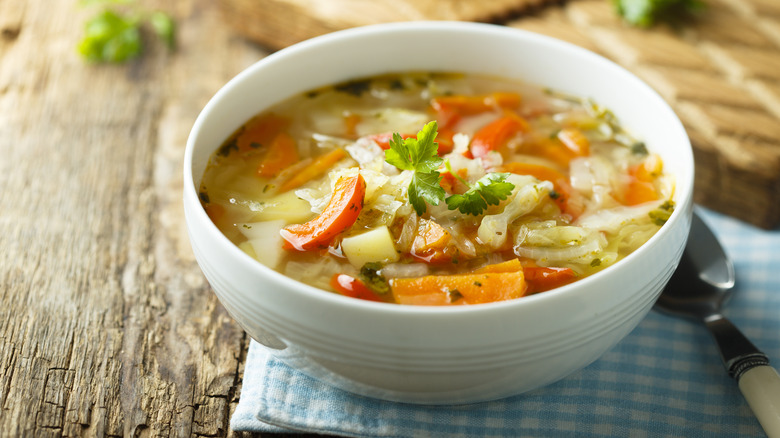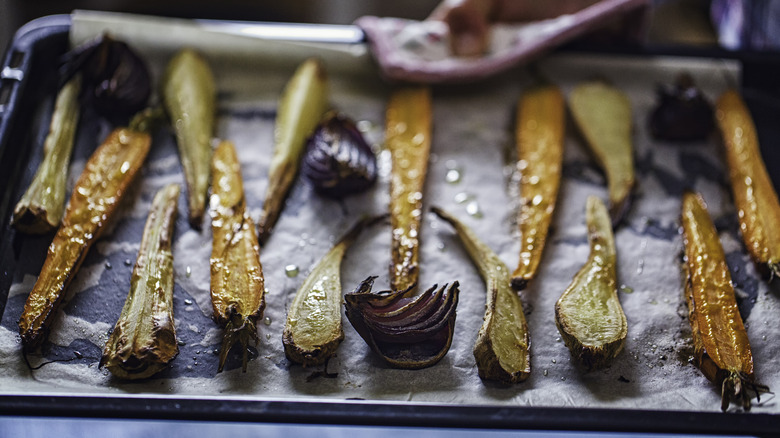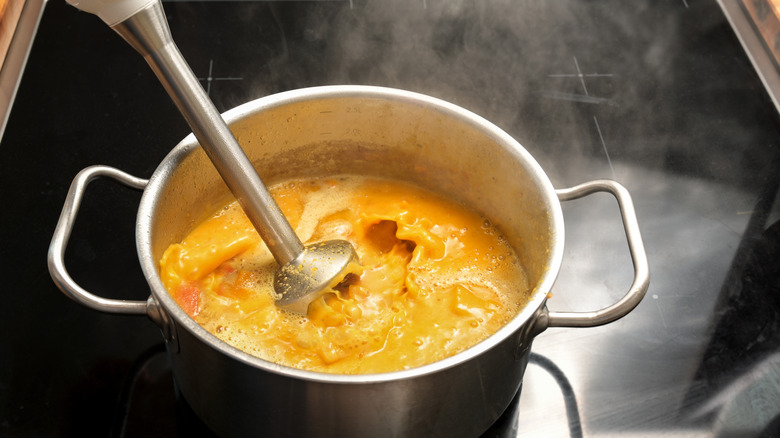The Oven Trick For Making Soup That Tastes Like It Simmered All Day
It's very often the case that, the slower something is cooked, the better it tastes — okay, maybe not so much with fresh fish, but certainly with a soup that's been simmering on the stove for hours. Flavors develop and blend, making the whole greater than the sum of its parts. It's also often the case that we don't have all day to make dinner, so it takes a canny cook to make something taste like they did. Here's a good trick for your next knock-together soup: cut your veggies into large chunks and dry roast them in the oven first; this will give them a deeper flavor and earthy sweetness that no amount of simmering will be able to achieve.
Once you've roasted and simmered the vegetables in broth for an hour or so, you can use a blender (immersion or otherwise) to bring the whole thing together. Except for perhaps celery, there's no vegetable that won't be made more soup-worthy by roasting — and this is as true for tomatoes as it is for root vegetables. But what's so great about spending a little time in the oven when you're going to simmer the things anyway?
Evaporation, caramelization, and the Maillard reaction
Sure, both simmering water and a preheated oven are hot and will cook raw meats and vegetables. But dry roasting (that is, subjecting vegetables and protein to high heat without first coating them in oil) allows for the water inside the food to evaporate — something that will never happen in the soup pot. As you can imagine, this evaporative process concentrates the food's flavors, but it accomplishes something more: it acts as a prelude to the Maillard reaction, a poorly understood but universally beloved series of chemical reactions that give us toast, roasted coffee, and that crisp crust on a flash-grilled steak.
Oven-roasted potatoes are more tender, obviously, but also less starchy and more delicious. Their skin has caramelized: that is, it has browned and sweetened — this is all thanks to the Maillard reaction. Now, think of what's going to go in your soup: root vegetables like onions, carrots, garlic, parsnips? Butternut squash or vine-ripened tomatoes? Each will be made more earthy and deeply flavorful through dry roasting. Now, let's get into why we're recommending roasting veggies without oil.
Dry roasting: less mess, more flavor
It might sound weird to not toss your veggies in oil before popping them in the oven. But the fact is, not only is that step entirely unnecessary for this purpose, it can interfere with evaporation and flavor development. Even if you're using oil with a high smoke point, you're still creating a barrier between the moisture inside the food and the oven's environment, inhibiting evaporation. Once that does happen, it often causes splattering. Oh, and even "neutral" oils can mask the food's inherent flavors too, by imposing their own.
More than that, dry-roasted veggies are primed to absorb other flavors. Any good soup is a combination of delicious ingredients, and dry-roasted veggies will act as sponges to absorb both a stock base as well as the essence of their soupy counterparts. So, with dry roasted veg incorporated, after just an hour or two of simmering, you're going to end up with a deeply satisfying, sublimely-flavored soup. It's just something a canny cook is able to do.


